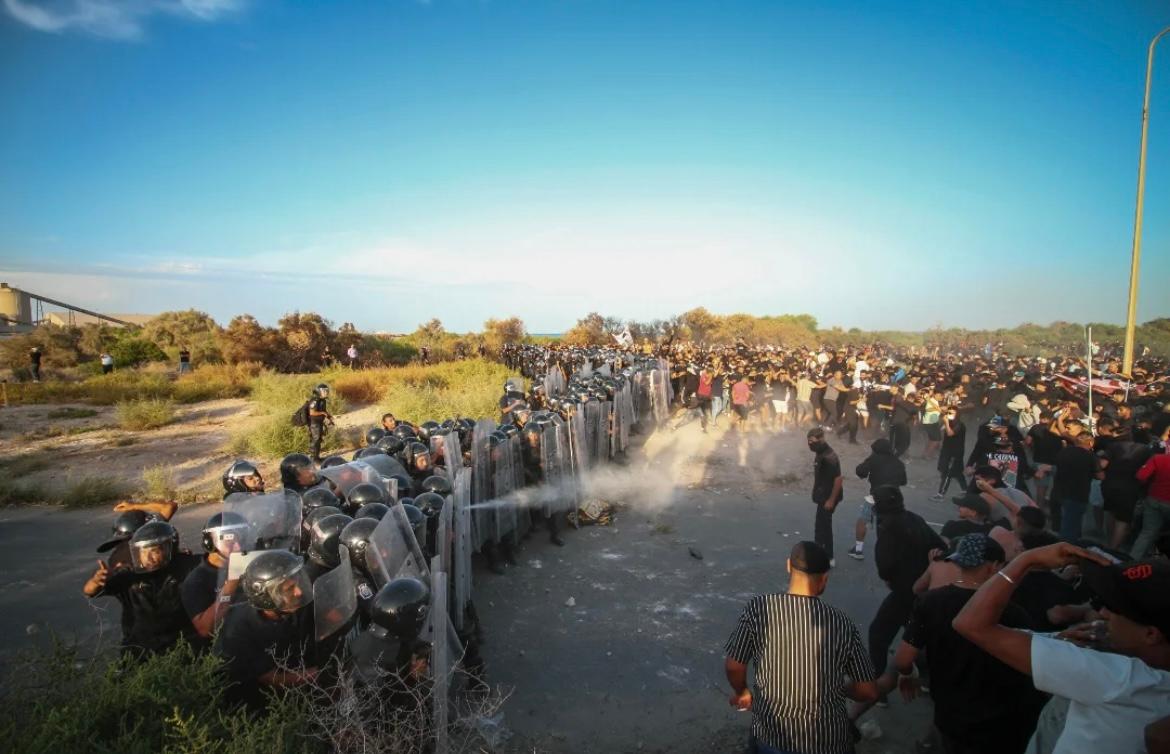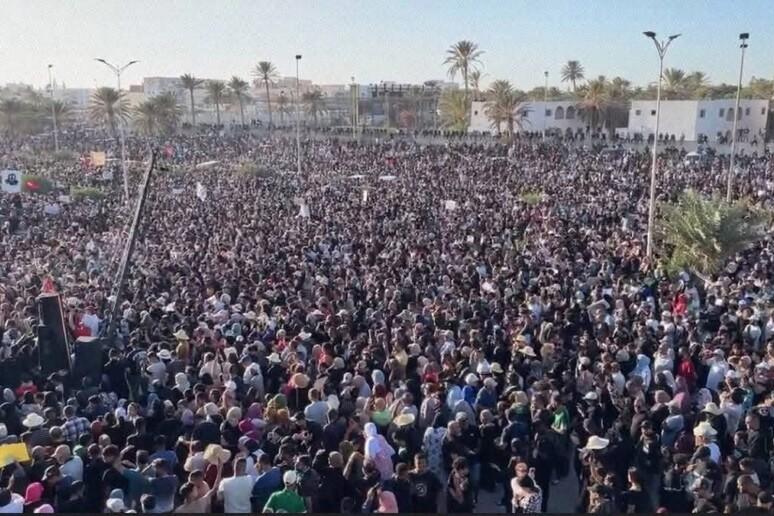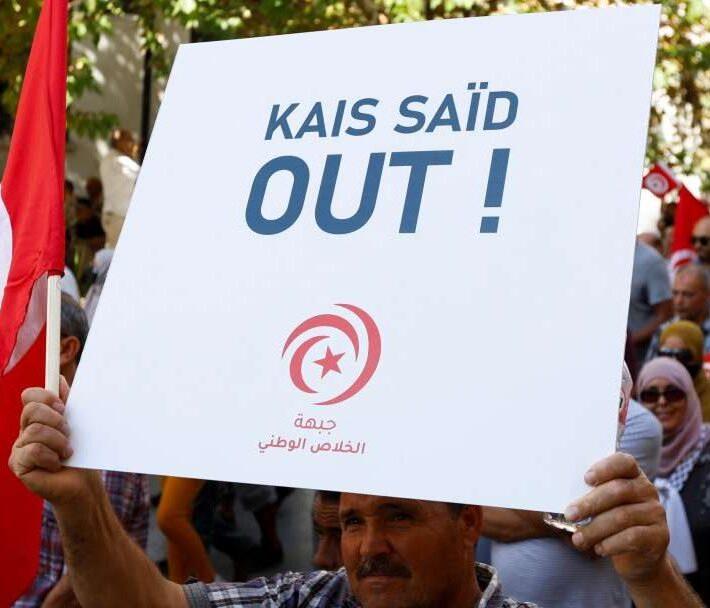Ben Ali trembles! From blogs to trade unions bureaus the Tunisian revolt explodes
Dictator Ben Ali trembled! And he is still trembling if is it true that he parked a jet plane close to the presidential residence of Chartage, which should be ready for an evacuation plan.
The revolt stretches its lenght, spreads itself through all the cities and bears down on the regime after 23 years from its institution. Even in Tunisia, as well as on the other side of the Mediterranean Sea, the struggling education sector is the one which is starting a process of refusal and social conflict,emerging from the crisis as social vanguard and convergence point for the many workers’ struggles that have been coming one after the other – as fragmented as radical and brave – for decades now.
After december 17th when Mohamed Bouazizi, a graduate and unemployed man, set himself on fire in Sidi Bouzid in protest against the seizure of his grocery stand, Tunisia mobilized and the revolt started off. First localized in the Sidi Bouzid zone, it later did spread to all the productive hubs of the Maghrebi country, and then reached even the most peripherals towns and zones, in a weaving of solidarity and struggle that sees side by side upper-school and university students, upper-school professors, workers, unemployed, lawyers and rank-and-file trade unions’ activists, unwilling to yield to the extremely violent repression carried out by the regime.
The intersection, or an incidence, between two spaces of organizations is supporting struggles and mobilizations – indeed, trade unions and social networks, and blogs. The former, since the very first day of uproar in Sidi Bouzid, had their doors wide opened by the rank-and-file trade-unionists; which turned their office rooms into hubs where knowledge, passions and skills of the emerging subjectivities have come together. The students and the unemployed graduates had therefore found a place where they could connect the political revival of the revolt to the skills developed by many rank-and-file trade unionists, and to the knowledge of lawyers and upper-school professors that in great numbers did choose from the beginning on which side to stand.
So, the trade union offices did become places for assemblies in the moments of respite, but also bases and permanent social garrisons where having marches and initiatives start from in all Tunisian cities. The call which roams everywhere on the web is to go in front of the trade union’s bureaus and wait for the numbers to increase, then march on or carry out the protest initiative. And even this time the social networks are able to give continuity to the communications between the localities and to denounce the repression of the regime.
Ben Alì’s state apparat did put under surveillance the whole Tunisian web in the month of december, yet. After the “Cable Gate” burst Wikileaks was shut down and, more in general, was inhibited the access to all those information sources which carried on the cables – characterized by overtly critical tones against the north-African regime – and that since the outbreak of the revolt became the point of reference of the rioters’ web communication.
With the deepening of these days’ protests the netwar did immediately deepen and experienced several hikes. Since december 30th, the Tunisian netizens’ communications (whose Facebook community is the biggest in the whole Northern Africa) are being hindered by a sophisticated censorship system (codenamed “Ammar”), able to prevent diffusion of photos, videos, keywords (as the #sidibouzid hashtag used on Twitter) and other real time updates to the rest of the planet.
Still, in the latest hours, this frame was crossed and shocked by the initiative of Anonymous, the hacktivist organization responsible last month for large scale attacks against Mastercard, Visa, Paypal, Amgazon and all the other firms and companies that, after Washington’s pressures, did de facto contribute to the international isolation effort of Wikileaks, cutting its financial channels and forfaiting availability to host its technical platform. Through a brief communique, whose feeling is that of a call to arms, Tunisia operation was issued (#OpTunisia).
In no uncertain terms the hackers of the now notorious organization forced Chartage’s police regime to choose: as long as the media blackout – which is making impossible a news reporting of the Tunisian protest – will go on, all the organizations responsible for that censorship will be the target of computer attacks. And the promise was kept: in a few hours, one after another, several government websites were made unreachable.
But, whether in december Anonymous “just” carried out some DDOS (that is, operations aimed to prevent access to a website channeling towards it a great deal of information, in order to make it unavailable), the attacks of these days marked a step up in class. The website of Mohammed Ghannouchi, the Tunisian prime minister, was defaced: for several hours in its home page stood a message in which was reaffirmed that “Operation Tunisia” would have to go on as long as necessary. Or at least until Tunis’ government won’t decide to remove the cloak of censorship which envelopes the country’s internet communication system.
Actually even this operation is contributing to change the balance of power between the crowds and the regime, as social networks and blogs continue to publish information and work as a tool for the promotion of initiatives, as the recent flash mob organized in the capital shows – managing to block trains and metro lines, occupied by the demonstrators which joined the initiative, and which involved a lot of other people which had no chance to read the event page set up on Facebook.
So, trade unions’ bureaus and the web are by now the two spaces crossed by the spontaneous organization of the Tunisian revolt that, in front of an incredible repression, continues to carry on the program of demands. If, in the beginning, the contents of the first uproars were bound to a demand plan basically interested in reclaiming employment for the unemployed upper-school and universitary graduates, with the extension of the mobilization to other cities the crowds began to demand and struggle, wishing and affirming the will to conquer even more: that is, the freedom from the regime, and a general re-distribution of wealth against the crisis. This as formidable as sudden step in the revolt program proves the subjectivity leading the mobilization to be right: the struggling education sector is managing to speak to all the society and to involve into the crowds’ demonstrations many other struggles, both for workers and civil rights, that previously were actually hardly communicating and were suffering fragmentation.
Thanks to these days of revolt, the Gafsan miners (who brought to life a mobilization with insurrectionary tendency in 2008) can have today on their side dozens and dozens of lawyers, struggling to open up spaces of justice in the Tunisian police regime. But this is just an example of many other similar reciprocity backgrounds between social and political issues coming together in the squares today, starting from the trade unions’ bureaus and from the social networks.
Struggle and organization have been allowing, for more than 20 days, to withstand an harshest degree of repression unleashed, in addition to disinformation and censorship, on the territories and on the demonstrators’ bodies. Immediately the regime employed all of its violence and brutality to put out and block the mobilization: Sidi Bouzid’s city was completely shut down and besieged by police and army, that in other cities shot against the demonstrators as well, killing two and wounding dozens of them; many house searches were carried out in the comrades’ homes and the nightly and in-demonstration arrests brought dozens and dozens of demonstrators in prison. These repressive events against activists, trade-unionists and demonstrators are joined by the tortures carried out against youths, even minors (in Menzel Bouzayane even a 14-th years old child was tortured during a provisional arrest), and kidnappings and beatings of reporters and lawyers. The latter both in Tunis and in other cities were not able to enter the court rooms as they were charged by the riot police (as happened in the capital) or beated in their precincts by the political police. Disappeared lawyers, beaten or kidnapped and then abandoned off-city, reporters pre-emptively arrested or with their houses surrounded by political police, which seizes computers, video-cameras and mobile phones.
This time, all of this repressive machine seems not to intimidate the movement but instead, as a female lawyer – kidnapped and released after some days by the political police – declared: “Ben Ali understands that this time his days may be numbered; in the television speech made by the dictator for the first time we caught an early thrill, an early sign of collapse”.
And she’s right, since during the first week the institutional media and communication framework simply ignored the cities in state of siege, the army shooting at the demonstrators, the suicidal attempts of the unemployed – in short for the official media the mobilization didn’t exist at all.
But in the following week the regime had to take one step back, until Ben Ali, during a nation-wide speech on the regime’s channels, admitted that “efforts of exploitation of social unease are taking place, through the efforts of isolated groups of criminals, manipulators and provocateurs that want to hijack it towards noxious political goals”. This admission, in the context of the Tunisian police regime, is the first recognization of an ongoing social revolt, with no more easily controllable outcomes by it, and that in the strike called on january 12 could find the occasion to take yet another step forward.
For their composition, for the power they are expressing and the strenght they are acquiring, the days of social conflict in Tunisia show once again how the fire of knowledge is able to aim high into the territories of crisis and to open up spaces of autonomy, to become a foremost social vanguard where the work of the arms and of the brains recognize each other as common and reciprocal background of struggles and liberation from crisis and exploitation. From the old trade unions’ bureaus the aim is for the governatorate; from the web the regime’s websites are being wrecked down; in both places people organize spontaneously : this weaving is a sign that, even beyond the borders of Fortress Europe, the alternative to the crisis which is always and only the struggle and organization is building another world without borders, finally our own one.
Ti è piaciuto questo articolo? Infoaut è un network indipendente che si basa sul lavoro volontario e militante di molte persone. Puoi darci una mano diffondendo i nostri articoli, approfondimenti e reportage ad un pubblico il più vasto possibile e supportarci iscrivendoti al nostro canale telegram, o seguendo le nostre pagine social di facebook, instagram e youtube.



















